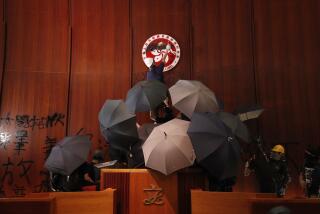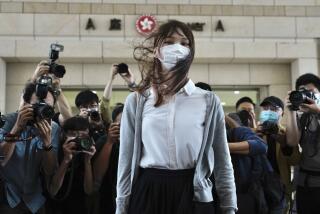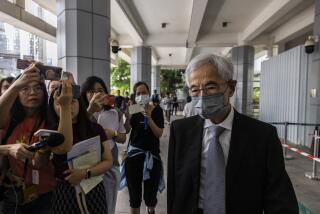Occupy leaders in Hong Kong seek protests’ end, plan to surrender
The three founders of Hong Kong’s Occupy movement, who helped sow the seeds of the territory’s 2-month-old pro-democracy protests, called on demonstrators to go home Tuesday and said they would turn themselves in to police.
The emotional announcement by the three leaders of Occupy Central With Love and Peace, urging students to “retreat to advance,” saps further strength from the sit-ins that rocked this Chinese territory beginning in late September and captured the world’s attention. In recent weeks, the demonstrations have withered amid exhaustion, violent clashes and conflicts over strategy.
Occupy Central’s proposal for a civil disobedience campaign — dating back to early last year — helped fuel China’s longest pro-democracy protests, although the founders’ prominence was later eclipsed by student activists as the demonstrations snowballed into what became known as the “umbrella movement.”
Now, many of the protesters do not answer to any organization and consider the movement to be leaderless, with some even questioning the nonviolent approach championed by the three Occupy leaders.
The three men — a pastor, Chu Yiu-ming, and two professors, Benny Tai and Chan Kin-man — said at a news conference that they would surrender to police Wednesday. Tai, a law professor at the University of Hong Kong, said the three had broken the statute against unauthorized assembly under the city’s public order ordinance but are prepared to be charged with more serious crimes.
“The fight for democracy is a long-term struggle and we believe the umbrella movement has awakened the democratic aspirations of a whole generation,” the three said. “Tomorrow’s battleground is expansive and now is the time to transform the people’s strength into a sustainable civil society movement, to sow the spirit of democracy deep into the community.”
Chinese authorities have repeatedly denounced the demonstrations as illegal. How forceful Hong Kong authorities might be in prosecuting the three, as well as others who have been arrested in the course of the protests, remains to be seen; protracted trials could deepen divisions in the territory of 7 million.
Chu, Tai and Chan said that turning themselves in shows respect for the rule of law. “Surrendering is not an act of cowardice; it is the courage to act on a promise,” they said. “To surrender is not to fail; it is a silent denunciation of a heartless government.”
The trio’s surrender has been long anticipated but controversial among the protesters, coming at a time when the movement has hit a nadir. On Sunday, an attempt to lay siege to government buildings was beaten back by police, leaving protesters at sea as to their next steps.
“This move will further degrade and destroy the movement. It helps the Chinese Communist Party to split it up,” said city legislator and Occupy protester Albert Chan.
Equally controversial may be the hunger strike started Monday by three teenage students, including Joshua Wong, founder of the high school activist group Scholarism. They appeared at a rally Tuesday night, donning headbands inked with the Chinese words “hunger strike.”
One of the hunger strikers, college freshman Isabella Lo, said her family has come to terms with her decision. She urged doubters to “please suspend all judgment and show some support.”
Hong Kong, a former British colony, reverted to Chinese rule 17 years ago under a compact that ensured a certain level of autonomy for the territory. The demonstrations erupted when Beijing published guidelines for the 2017 election for the region’s chief executive that were seen as giving mainland authorities effective veto power over who runs.
After drawing massive crowds to the streets in September and early October, the protests have diminished substantially, although a few thousand demonstrators remain encamped in the Admiralty and Causeway Bay neighborhoods.
The tents in the Mong Kok area were dismantled by police last week, and the remaining encampments face the possibility of being cleared as well.
Legislative Council President Jasper Tsang said Tuesday he had “sufficient reason” to apply for a court order to remove the tents surrounding the council. If approved, it would be the first time a government entity took legal action against Occupy. All previous injunctions were sought by private companies.
Nonetheless, many protesters still in the Admiralty Occupy zone said they would not back down.
“If we retreat now,” Ralph Chan asked, “will it achieve the purpose of our movement?”
Tai and the other Occupy leaders, though, said a pullback would allow the movement to regroup and fight another day.
“In the past two weeks, the police have cracked down hard on protesters in the occupied sites. Our young people have used their bodies to withstand the blows of police batons, their blood and broken bones have brought us the deepest sorrow,” they said. “For the sake of the occupiers’ safety, for the sake of our original intention of love and peace, as we prepare to surrender, we three urge the students to retreat — to put down deep roots in the community and transform the movement to extend the spirit of the umbrella movement.”
Law is a special correspondent.
More to Read
Start your day right
Sign up for Essential California for news, features and recommendations from the L.A. Times and beyond in your inbox six days a week.
You may occasionally receive promotional content from the Los Angeles Times.






